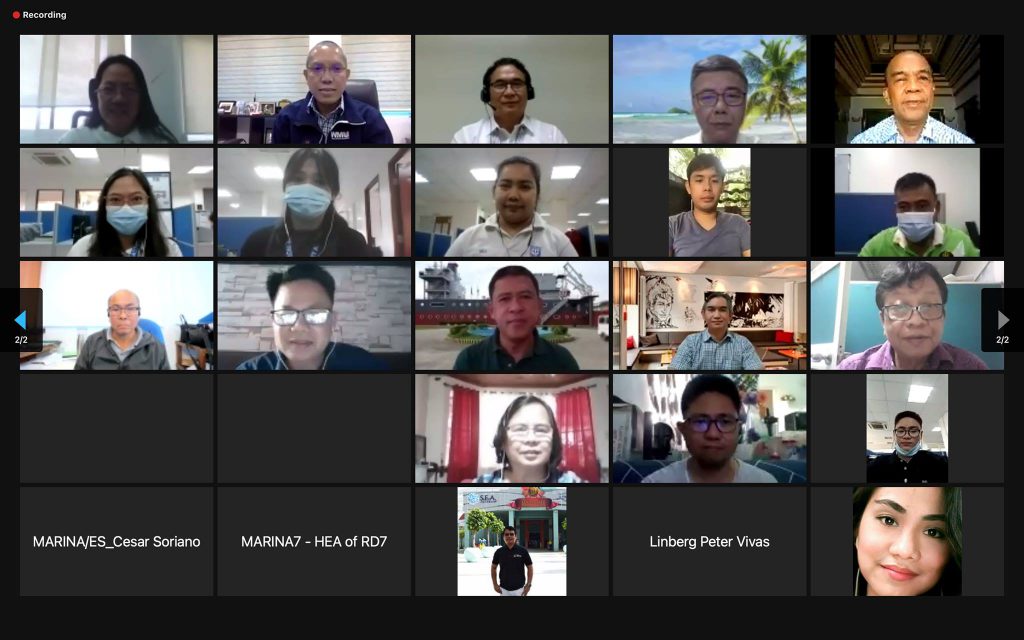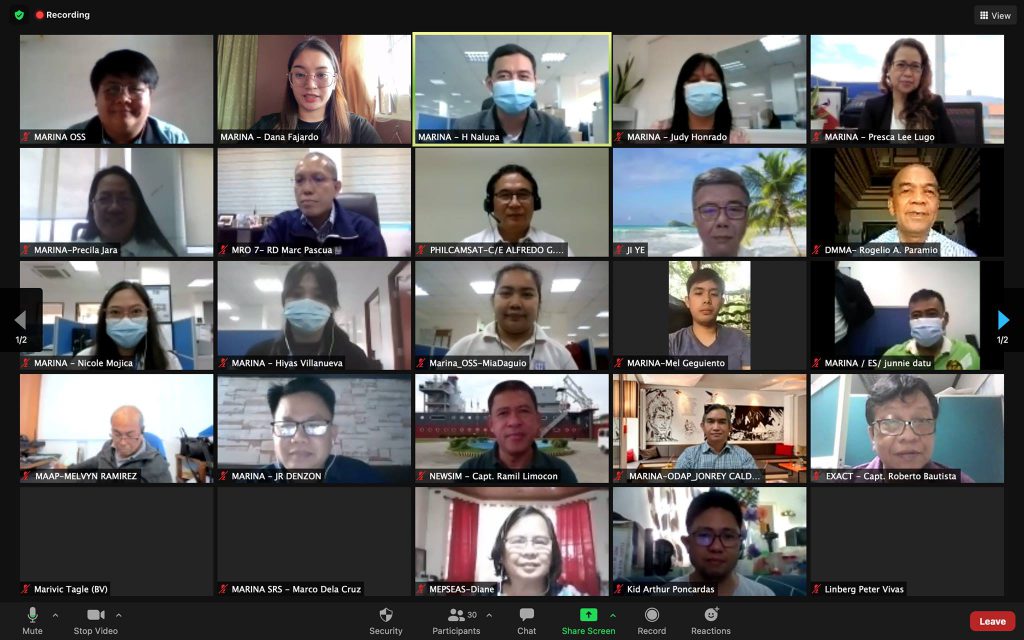Aiming to have a unified set of knowledge and understanding necessary in the implementation of the Ballast Water Management (BWM) Convention in the Philippines between government agencies and partnered private stakeholders, the Maritime Industry Authority (MARINA) held the Seminar on the International Convention for the Control and Management of Ships’ Ballast Water and Sediments (BWM Convention) on 08 to 10 February 2021 via video conference.
Graced by the Officer-In-Charge of the MARINA Maritime Training Institute (MARTI), Ms. Presca Lee B. Lugo highlighted that this seminar is based on the Marine Environment Protection of the Southeast Asian Seas (MEPSEAS) Training Course wherein it aims to raise the awareness of the stakeholders, particularly of the Maritime Higher Education Institutions (MHEIs) and Maritime Training Institutions (MTIs) to the said Convention, and to come up with an action plan on how the provisions of the BWM Convention be incorporated in their curriculum courses.
The seminar proper began with the MEPSEAS National Expert and Director of the MARINA Region VII, Engr. Marc Pascua, providing an overview of the seminar as well as of the MEPSEAS Project. Dir. Pascua shared that the main purpose of the said project is to ratify and implement high priority instruments related to marine environmental protection, which includes the BWM Convention, to its partnering countries and to have a legislation that will support their implementation.
In his presentation, Dir. Pascua underscored that the implementation of the BWM Convention and Anti-Fouling Systems Convention in the country is necessary, as the latter heavily relies on shipping for transportation of persons and goods. The Philippines is also one of the 18 mega-biodiverse countries immensely rich in terrestrial and marine biodiversity.
Moreover, Dir. Pascua likewise discussed the other important factors to consider for the effective implementation of the BWM Convention such as the ratification process, compliance, enforcement, and actions/proposals.
Engr. Jose Romualdo Q. Denzon of the MARINA – Maritime Education and Training Standards Supervisors (METSS) presented the issues and international response of the BWM Convention. He also added in his discussion the various Ballast Water Management options, standards for the Ballast Water Management, and compliance monitoring and enforcement.
Mr. Jimmy Ye Ji, Director of the Operations Support within South East Asia Region Marine and Offshore Manager of the Bureau Veritas, reported the technical provisions and guidelines of the BWM Convention as well as the obligations of the flag, port, and coastal States under the said Convention.
Meanwhile, Director of the MARINA – Franchising Service, Atty. Maximo I. Bañares, presented the discussion on the guide to drafting a BWM Act.
On the other hand, MEPSEAS National Consultant, Ms. Diana Factuar, and Engr. Joshua Rafale S. Tolin of the MARINA – Shipyards Regulation Service, reported on the National Strategic Action Plan for the implementation of the BWM Convention and the rules and regulations on the control and management of ships’ ballast water and sediments in compliance to the said Convention, respectively.
Lastly, PO2 Franz Jomel M Badajos PCG, Senior Port State Control Officer from the Philippine Coast Guard (PCG), discussed the port state control procedures for the BWM Convention.
The MARINA Deputy Administrator for Operations, Engr. Nannette Z Villamor – Dinopol, concluded the said seminar by expressing her gratitude to the participants and resource speakers and by reiterating our obligation to the marine environment.
“I would like to encourage everyone to continue being stewards of this social and shared responsibility of strengthening our commitment in protecting our marine environment,” Engr. Dinopol highlighted.
The said seminar is attended by the representatives from the PCG, MARINA, and various MHEIs and MTIs.
BWM Convention
The International Convention for the Control and Management of Ships’ Ballast Water and Sediments, 2004 or the Ballast Water Management Convention (BWM Convention) is adopted by the International Maritime Organization (IMO) in order to help prevent the spread of potentially harmful aquatic organisms and pathogens in ships’ ballast water. The said Convention entered into force globally on 08 September 2017.
In compliance with the said Convention, the MARINA recently published Circular No. SR-2020-05 to set rules and regulations for the control and management of ships’ ballast water and sediments to all Philippine-registered ships plying in the international trade as well as international ships plying in Philippine waters.
The said issuance is aligned with MARINA’s objective of having an efficient shipping industry and environmentally sound maritime industry.




